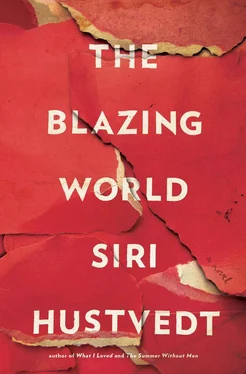TB: Heavy stuff, but then, that’s what got you where you are, right?
AT: Yeah, that’s what they tell me.
Stay tuned for the next spooky installment of Anton Tish, art world phenom gone quantum!
Rachel Briefman (written statement)

On Sunday, February 28, 1999, Harry told me about Anton Tish. I remember the date because, after she left, I recorded the details of our exchange in my journal. I have edited those invaluable notes here.
Although it was chilly and gray outside, I had put on a fire, and we were warm. Harry was wrapped up in a dramatic hand-knit purple sweater and had removed her shoes so she could rest her feet on the sofa cushions. Ray had left the city to give a paper at a conference in Washington, and the two of us were alone with Otto, our Yorkie, who was such a nervous little beast the vet had put him on Prozac, a drug that had absolutely no effect as far as we could tell but gave us the comfortable feeling that he was being “treated.” Otto rudely and repeatedly sniffed Harry’s crotch as we sat in the living room, which made Harry joke that Otto, who had been named after Otto Rank, was merely doing further research on his “pet subject, birth trauma.”
Before that afternoon, I knew nothing about the show at the Clark Gallery or its success. Although I regularly take in museum shows, I do not follow contemporary art closely, and a great many battles are fought and banners raised in that insular world without my knowledge. Harry, however, had come armed with reviews and photographs, so I was able to see her illustrated woman, as well as the boxes that were, as she said, the “real” work, the ones that counted.
Once I had understood exactly what Harry had done, I wondered aloud what good it did to give credit to someone who didn’t deserve it. Why? Harry stubbornly insisted that the deceptive game was being played for a reason. It wasn’t merely a sleight-of-hand trick; the magic had to unfold slowly and eventually be turned into a fable that could be told and retold in the name of a higher purpose. At some as-yet-undisclosed moment, she would stride forth out of the shadows to expose and humiliate “them all.”
Their humiliation did not strike me as a higher purpose, and I told her so, but she countered that it was just a small, if inevitable, part of the plan. Harry had long talked about them. They had persecuted or ignored her for years, but someday they would regret it. After her parents and then Felix died, this monolith of adversarial forces seemed to grow rather than diminish. An enemy with a masculine, not a feminine face, it swatted the likes of Harry away like a mosquito. She had fantasized about her revenge for years, and now it had come — sort of. What did it mean that an amorphous they had celebrated her work when it arrived in a twenty-four-year-old body with a cock , to borrow Harry’s words? What were the enthusiasts actually seeing, I asked, her work or just Anton, the portrait of the artist as a young hunk? How many people really looked at art? And if they did, could they see anything in it? How did people actually judge it? Since my interests ran more in the literary direction, I mentioned to Harry that Beckett’s Murphy had been rejected forty-three times and pointed to the many stories of literary journalists typing up manuscripts of celebrated novels, sending them off to publishers, and receiving standard rejection letters (or worse) in return. Without the aura of greatness, without the imprimatur of high culture, hipness, or celebrity, what remained? What was taste? Had there ever been a work of art that wasn’t laden with the expectations and prejudices of the viewer or reader or listener, however learned and refined?
Harry and I agreed there had never been such a thing. She said that her idea was not just to expose those who fell into her trap but to investigate the complex dynamics of perception itself, how we all create what we see, in order to force people to examine their own modes of looking, and to dismantle their smug assumptions.
After this foray into the ambiguities of vision, Harry fell silent as she often did, her large eyes focused on her inward narrations. I nudged her to tell me what she was thinking about, and she began another disquisition. We are all mirrors and echo chambers of one another. What actually happens between people? In schizophrenia people lose their boundaries. Why? Because I knew Harry well, I understood that this was not a digression but a circling device to home in on a more personal confession. Finally, I said, “What is it you are really trying to tell me, Harry?”
After another minute or so of not speaking, Harry leaned toward me, put her hand on my arm, and confessed that during their adventure Anton had gone a little crazy. In the beginning, it had been fun, she said, a grand joke the two of them were going to perpetrate on shallow, preening art world types who could make or break reputations, the pompous asses who knew so much about so little. Harry and Anton had worked everything out between them. She had set him up in a studio, had offered him the proceeds from any sales, and had given him a crash course in Western art, an idiosyncratic survey of what really mattered since the Greeks, according to Harriet Burden. In Harry’s class, Duccio di Buoninsegna, the Siennese master, gets more space than Michelangelo, and the perfection of Raphael is relegated to a footnote. This was fine with Anton, of course, who knew next to nothing to begin with. As they worked on the Venus, Anton started calling Harry at all hours to ask questions about the work: Why is the graffiti on her elbow again? Tell me about David and the French Revolution again. Which one is Emil Nolde again? Before long, she said, her answers and comments became his. No one owns language. Do we remember the sources of our own ideas, our own words? They have to come from somewhere, don’t they? Anton read books and essays Harry gave him, watched films she recommended, and eagerly digested her opinions.
Although he had been sick with anxiety before the show and nearly fell apart at the opening, he had calmed down after its success. He had felt (as so many of us do) not only massaged by the compliments of his admirers, but that he richly deserved their praise, whether he had actually made the works or not. His majesty, the baby, that infant who believes he is the center of the world, still lives somewhere in all of us. Harry began to notice small alterations in Anton’s diction when he talked about the project, especially his use of pronouns. He said we and us and our repeatedly. He began to remember insights as his that weren’t his. Anton, she said, became half convinced that her art belonged to him. He knew I had done it and he didn’t know at the same time. He said to me, “I’m your mirror.”
Harry admitted that she had encouraged the idea that she and he were true collaborators. She had elevated his status to lure him into the ruse. As her pseudonym, Anton had played a vital role in the theater she had staged for a single viewer: herself. After all, the gallerygoers were not privy to the power behind the scenes. Anton was the performer. But was Anton playing Harry — or was Harry playing Anton? She said that without him there could have been no big Venus, that the hapless young man had kick-started the idea — shockingly ignorant novice makes sophisticated jokes about art history. But then, who actually believes himself to be shockingly ignorant? Least of all, the shockingly ignorant. And the boy had learned a lot during his tutelage with Harry. I couldn’t help but think that their story was an interesting reconfiguration of the Pygmalion myth with the sexes reversed. Anton was Harry’s creation, one made, to some degree anyway, out of her disenchantment with the world of men and its intractable biases against women. In the Greek myth, Pygmalion grows so disappointed with the opposite sex that he lavishes his love on his perfect sculpture, the ivory statue Galatea, who is granted life only at the very end of the story. Harry’s pretty boy had the misfortune to be made of bone and muscle and tissue from the start.
Читать дальше













